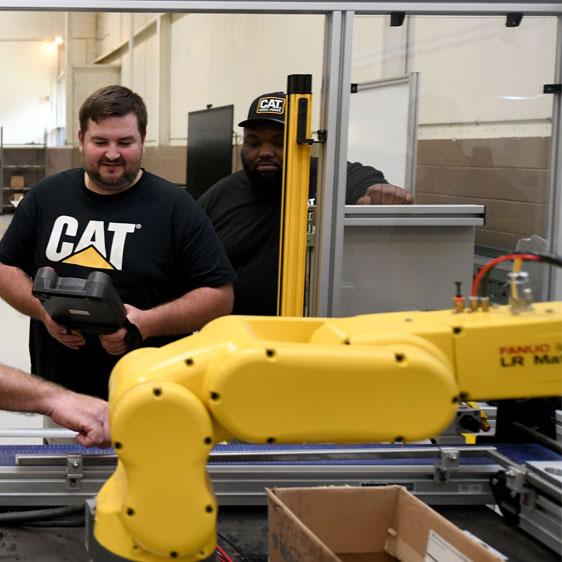Automation & Robotics

Explore a wide range of specialized training programs designed to enhance your skills in automation, robotics, metallurgy, and more. Whether you're looking for hands-on forge shop experience, live online sessions, or advanced software training, our courses cover essential industry topics like GD and T, CQI-9 audits, PFMEA, and industrial robotics. Choose from flexible learning options tailored to meet the demands of modern manufacturing and technology professionals.
Sample Courses
Below is a sample listing of the types of courses we can provide for area manufacturers. The content of most courses can be modified to meet the specific needs of your company. Additionally, unless tied to a certification or credentialing agency, the duration of most courses can be adjusted to meet your company’s needs and/or schedule.
Provides a technical overview of aluminum forging processing/aluminum metallurgy and how to apply this training to the manufacturing workplace.
Course Hours:
- 7 hours
- 0.7 credits
This live online training course will present over six weekly sessions that covers the de-coating of coated scrap, melting furnace practices, dross formation and processing.
Course Hours:
- 112 hours
- 11.2 credits
This training covers the key concepts for programming the CALYPSO software and will enable independent measurement of simple work pieces using the ZEISS manual for CMMs.
Course Hours:
- 28 hours
- 2.8 credits
The CQI-9 is a comprehensive audit covering the most common heat processes employed in the automotive industry.
Course Hours:
- 8 to 24 hours
- 0.8/2.4 credits
Provides classroom lectures in DX200 automation programming commands, reinforced with demonstrations.
Course Hours:
- 16 hours
- 1.6 credits
Provides on the job training in a forge shop with complete operation and process flow for the forging operation.
Course Hours:
- 276 hours
- 27.6 credits
Provides on the job training in HCM process with complete operation and process flow for the HCM operation.
Course Hours:
- 276 hours
- 27.6 credits
Participants will learn about geometric dimensioning controls used on mechanical engineering drawings.
Course Hours:
- 16 hours
- 1.6 credits
This course introduces GibbsCam lathe machine programming and focuses on geometry creation.
Course Hours:
- 14 hours
- 1.4 credits
Provides on-the-job training for general health and safety in the finishing area with a flow for the finishing operation.
Course Hours:
- 24 hours
- 2.4 credits
This course will provide an introduction to an overview for equipment maintenance and will understand the link between TPM and Lean.
Course Hours:
- 3 hours
- 0.3 credits
Provide training for those who will maintain the system, be responsible for maintenance, purchasing of parts, troubleshooting, etc.
Course Hours:
- 40 hours
- 4.0 credits
Liquid Penetrant is a versatile nondestructive method used for the detection of open to surface discontinuities in a wide variety of solid non-porous materials.
Course Hours:
- 20 hours
- 2.0 credits
The Novelis Molten Metal Delivery System is designed to deliver the required flow of filtered molten aluminum from holding furnaces to casting machines at the desired temperature and level.
Course Hours:
- 45 hours
- 4.5 credits
Presents the major components of the Process Failure Mode and Effects Analysis methodologies used in various manufacturing processes.
Course Hours:
- 8 hours
- 0.8 credits
Product safety and conformity are integral to protecting consumers and ensuring that products meet regulatory and quality standards. This course will provide understanding for the terminology, concepts, and principles regarding Product Safety and Conformity. The roles of the Product Safety representative will be outlined. A Product Safety Representative (PSR) is a key role within an organization tasked with ensuring that products meet safety and conformity standards.
Course Hours:
- 16 hours
- 1.6 credits
This course will provide employees with general rigging safety practices, wire rope slings, alloy steel chain, metal mesh slings, synthetic web slings, and natural and synthetic fiber ropes. They will learn the general safety practices, inspection requirements, proper storage of equipment limits, and proper storage of equipment hitches and slings. Instruction will also include how to identify size, grade, and capacity specifications.
Course Hours:
- 8 hours
- 0.8 credits
This course introduces participants to the principles of industrial robotics, exploring their uses, applications, and proper operation. It includes both lectures and hands-on lab exercises to reinforce learning and provide practical experience in robot maintenance and operation.
Course Hours:
- 40 hours
- 4.0 credits
Industry participants in this course will learn how to safely operate a robot and basic operations.
Course Hours:
- 10 hours
- 1.0 credits
This is a condensed version of the Industrial Robotics Technician course, offering participants an introduction to the principles of industrial robotics, their uses and applications, and proper operation through both lectures and hands-on lab exercises.
Course Hours:
- 16 hours
- 1.6 credits
Software training that introduces key interface terminology and techniques for importing geometries.
Course Hours:
- 24 hours
- 2.4 credits
This course offers a comprehensive hands-on overview of the THM System, including system and conveyor inspections. It covers the capabilities and limitations of the shot blasting machine, as well as daily machine inspections and maintenance/service procedures.
Course Hours:
- 8 hours
- 0.8 credits
This upgrade training covers the alterations to VDA 6.3 (latest edition), including updates to the questionnaire, changes to the evaluation, changes to the potential analysis, and other adjustments.
Course Hours:
- 4 hours
- 0.4 credits